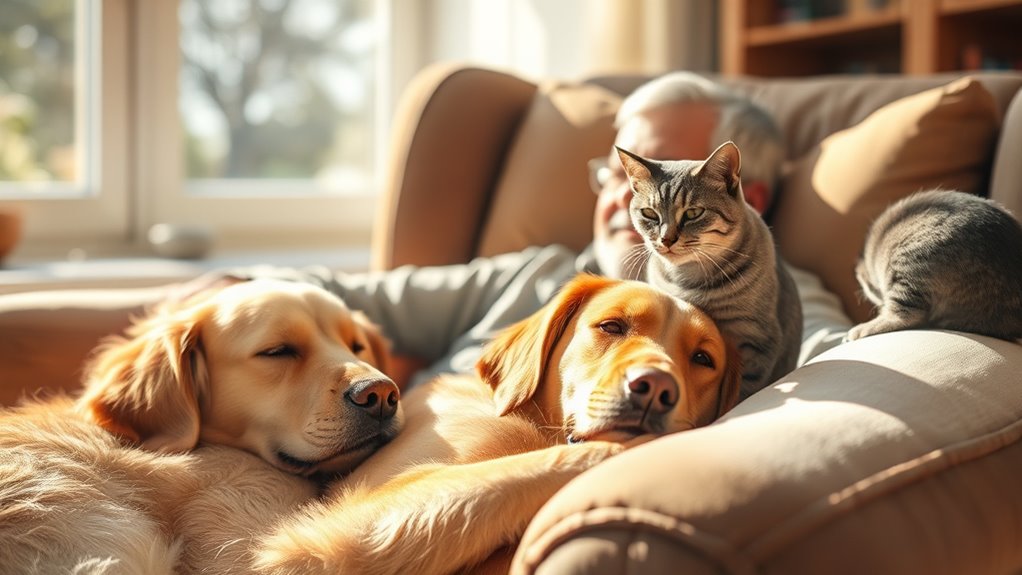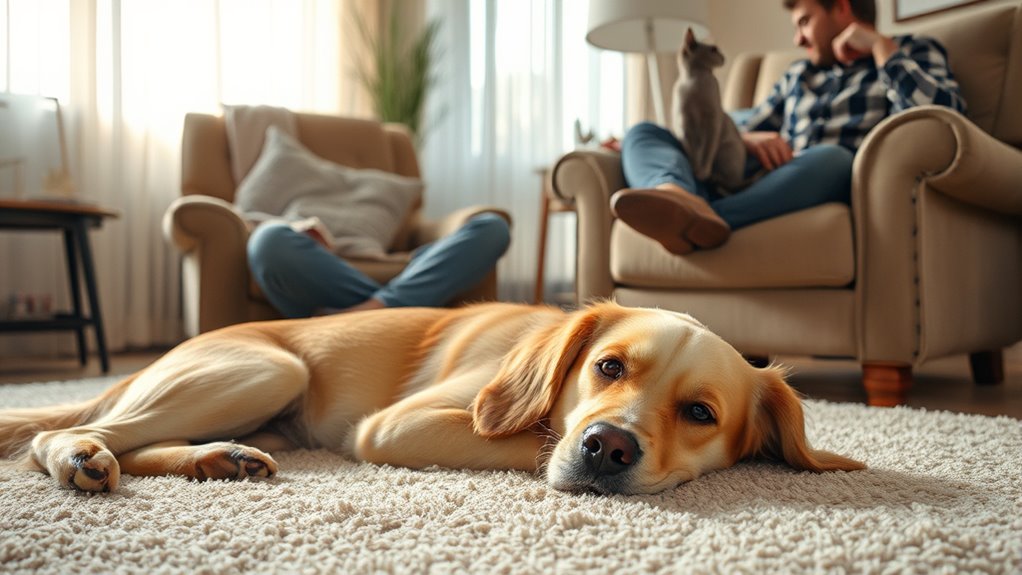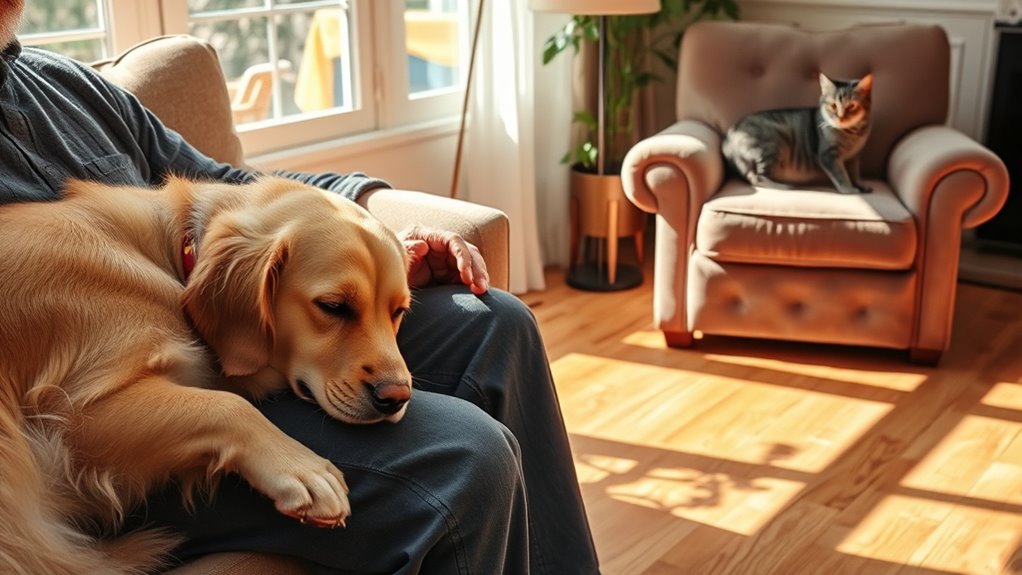Choosing between a cat or dog for your dad depends on his lifestyle and emotional needs. If he prefers low-maintenance companionship that offers comfort and independence, a calm, relaxed cat might suit him best. If he enjoys outdoor activity and social interactions, a friendly dog could be ideal. Considering his daily routine, space, and preferences will help you find the perfect furry friend. To discover more about matching pets to your dad’s lifestyle, keep exploring the options.
Key Takeaways
- Consider your dad’s lifestyle: active individuals may benefit more from a dog, while relaxed lifestyles suit a cat’s low-maintenance needs.
- Assess emotional needs: dogs often provide more active companionship and social engagement, whereas cats offer calm comfort and independence.
- Think about space and routines: smaller living areas and less routine may favor cats, while larger spaces and daily walks suit dogs.
- Evaluate health and mobility: dogs can encourage physical activity, beneficial for seniors, but require more care; cats are easier to care for with less mobility.
- Match pet temperament to your dad’s personality: a friendly, attentive dog or a calm, independent cat can enhance emotional well-being through suitable companionship.
Understanding the Benefits of Pet Therapy for Seniors

Pet therapy offers numerous advantages for seniors, enhancing their physical, emotional, and social well-being. When you bring an animal into their life, you provide more than just companionship—you create a source of comfort and stability. Animal companionship helps reduce feelings of loneliness and isolation, which are common among older adults. This connection can boost emotional well-being by providing a sense of purpose and unconditional love. The presence of a pet encourages routine and physical activity, supporting overall health. Plus, caring for an animal fosters positive emotions and reduces stress. As a result, pet therapy can markedly improve your dad’s mood, outlook, and quality of life, making it a valuable addition to his care and social environment. Incorporating proper nutrition into his routine can further enhance these benefits.
Key Qualities and Considerations for Cats as Therapy Pets

When considering cats as therapy animals, focusing on their key qualities can help determine if they’re a good fit for your dad. Cats are known for their Feline Independence, meaning they often enjoy alone time and aren’t overly demanding. This trait can provide comfort without overwhelming your dad. Additionally, proper Cat Care ensures they’re happy and healthy, which is essential for therapy work. Recognizing their natural color accuracy can also help ensure their expressions and moods are easily read, fostering better communication. Consider these qualities: 1. A calm, gentle demeanor that provides soothing companionship. 2. Independence that allows them to engage on their own terms, reducing stress. 3. Low-maintenance needs, making daily care straightforward.
Key Qualities and Considerations for Dogs as Therapy Pets

Dogs are often ideal therapy animals because of their friendly, attentive nature and strong desire to connect with people. To be effective, they need proper training requirements, including socialization and obedience skills, which ensure they remain calm and responsive during therapy sessions. Consistent training helps your dad feel confident in his dog’s behavior around new people. Grooming needs are also important; regular brushing and bathing keep the dog clean and comfortable, reducing allergies and skin issues. A well-groomed dog looks inviting and feels good, which enhances the therapy experience. Selecting a dog with the right temperament and training level is essential. Additionally, understanding the emotional needs of therapy dogs can improve their well-being and effectiveness. With the right care and preparation, your dad’s furry companion can become a trusted and comforting therapy partner.
Matching Your Dad’S Lifestyle With the Right Pet

Choosing the right pet means considering your dad’s daily routine, activity level, and living environment. If he’s active and enjoys outdoor walks, a dog that thrives on regular exercise could be perfect. For a more relaxed lifestyle, a low-maintenance cat might suit him better, especially if he prefers quiet moments. Think about pet nutrition needs and grooming routines — some pets require frequent baths and brushing, which could be challenging or enjoyable for your dad. Incorporating eco-friendly and safe materials in pet accessories can also contribute to a healthier environment for both your dad and his pet. Here are three ways to match his lifestyle:
- Opt for pets with simple grooming routines that don’t demand much time.
- Choose animals whose energy levels align with his daily activity.
- Ensure his living space accommodates the pet’s needs comfortably.
This helps ensure a happy, harmonious companionship.
Practical Tips for Introducing a New Feline or Canine Friend

Introducing a new pet requires careful planning to guarantee a smooth shift. First, focus on choosing the right breed that fits your dad’s lifestyle and energy level. Start with pet safety tips, such as securing hazards and supervising initial interactions. When introducing the new pet, keep interactions calm and controlled, allowing gradual familiarity. Use the following ideas to ease the process:
| Choose the right breed | Prepare the home | Supervise initial meetings |
|---|---|---|
| Match breed traits with lifestyle | Remove hazards | Keep pets on a leash or crate |
| Consider activity level | Set up a safe space | Use treats for positive reinforcement |
This approach guarantees safety and comfort, making the transition smoother for everyone involved. Additionally, monitoring the AI behavior and ensuring safety measures are in place can help prevent potential issues in AI safety.
Frequently Asked Questions
Can Pet Therapy Help With Specific Health Issues in Seniors?
You might wonder if pet therapy can help seniors with health issues. It can provide emotional support, reducing feelings of loneliness and depression. Additionally, pet therapy encourages physical activity, which aids in recovery and maintaining mobility. Engaging with animals can also lower stress levels and improve overall well-being. If you’re considering this for your dad, it’s a promising way to support both his emotional and physical health.
Are There Any Allergies Related to Cats or Dogs That Should Be Considered?
You’re opening a can of worms, but it’s important to consider allergies. Cats can trigger cat allergies, causing sneezing or itchy eyes, while some people have dog sensitivities, leading to similar reactions. Before bringing a pet into Dad’s life, check if he’s prone to these allergies. A quick visit to the doctor can save trouble down the road, ensuring everyone stays happy and healthy.
How Much Daily Interaction Is Required for Therapy Pets to Be Effective?
You should aim for at least 15-30 minutes of daily interaction with your pet to guarantee therapy benefits. This helps meet their exercise routines and socialization needs, which are essential for their well-being. Regular engagement, like playtime or cuddling, strengthens your bond and enhances their calming effects. Consistency is key—making daily interaction a routine ensures your pet remains effective as a therapeutic companion.
What Are the Costs Involved in Training and Maintaining Therapy Animals?
While training expenses can be significant, maintaining a therapy animal also involves ongoing costs like veterinary care, food, and supplies. These maintenance costs add up over time, contrasting with the initial investment in training. You need to take into account both aspects carefully, as quality care and proper training ensure your pet’s effectiveness and well-being, making the overall costs an essential factor in deciding if a therapy animal fits your situation.
Can Therapy Pets Assist With Mental Health Conditions Like Depression?
Therapy pets can definitely help with mental health conditions like depression. They provide emotional support and promote stress reduction, which can improve mood and decrease feelings of loneliness. By offering companionship, these animals help you stay active and engaged, fostering a sense of purpose. If you’re considering a therapy pet, keep in mind that their presence can be a comforting, natural way to manage depression and boost your emotional well-being.
Conclusion
Just like the timeless bond of a faithful companion in a classic story, choosing the right pet can bring comfort and joy to your dad’s life. Whether it’s the gentle purr of a cat or the enthusiastic wag of a dog’s tail, the right pet becomes a loyal friend in his golden years. By understanding his needs and preferences, you can help him find a furry companion who’ll be there through thick and thin, just like a true hero.









